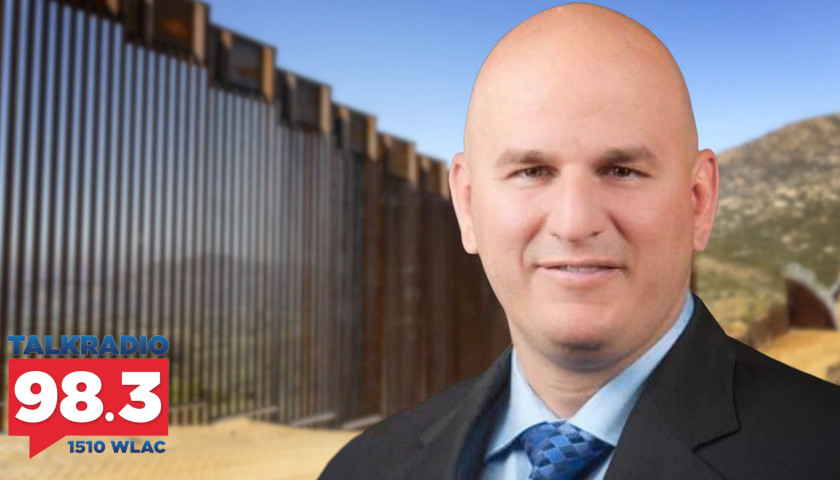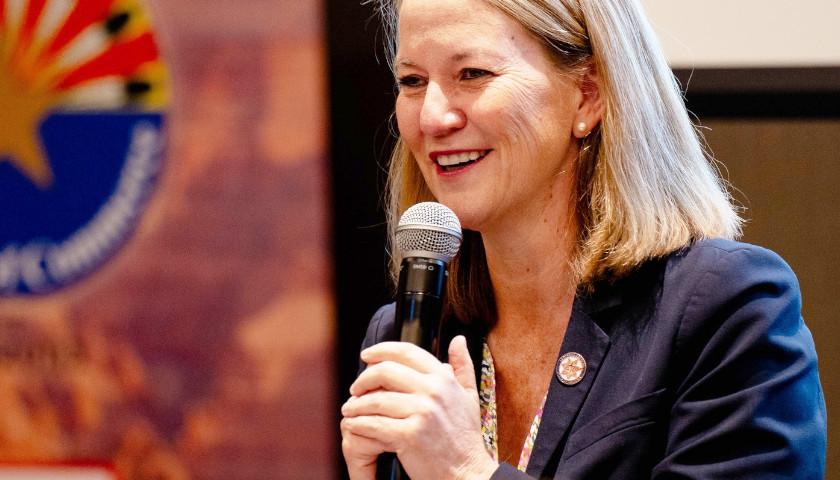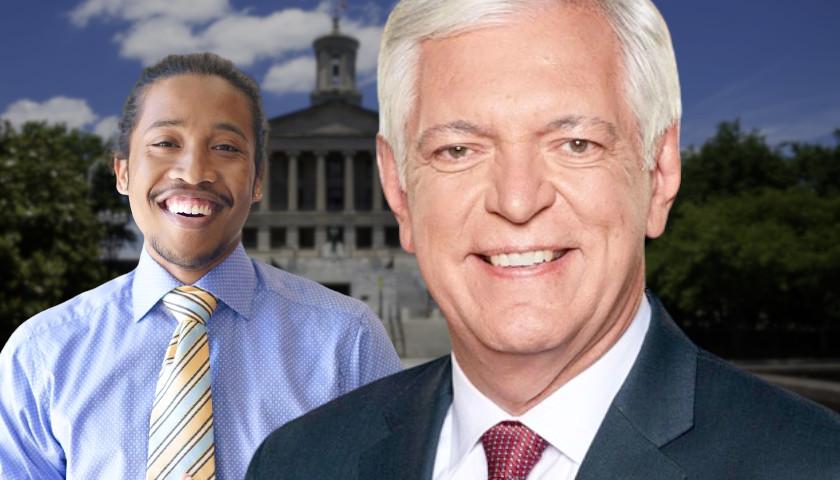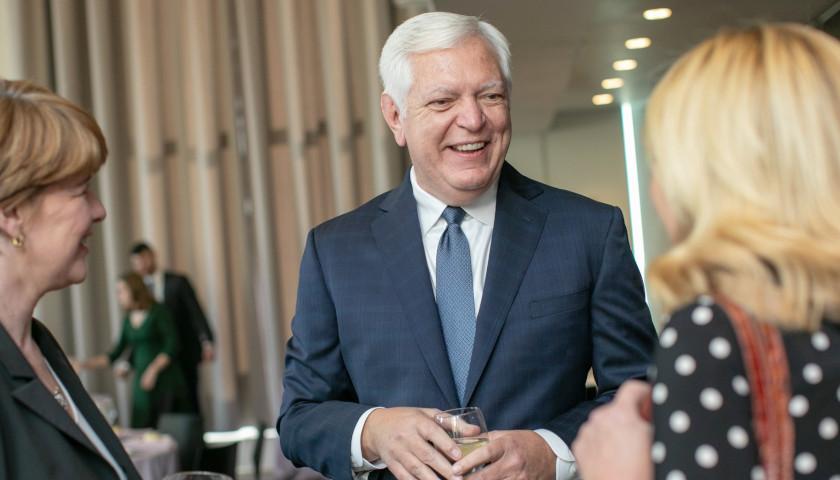Live from Music Row Monday morning on The Tennessee Star Report with Michael Patrick Leahy – broadcast on Nashville’s Talk Radio 98.3 and 1510 WLAC weekdays from 5:00 a.m. to 8:00 a.m. – host Leahy welcomed special guest Brandon Judd, President of the National Border Patrol to the show to talk about the crisis at the border and what the Biden administration can do to fix it.
Leahy: We are joined on our newsmaker line by Brandon Judd who is the president of the national border patrol Council. This is a labor union set up back in 1967. It represents eight border agencies and support staff on the United States border patrol. 18,000 members. They endorsed Donald Trump in 2016 and in 2020. Brandon, according to Jen Psaki the press secretary for Joe Biden, there’s a challenge at the border. But not a crisis. Do you agree or disagree?
Judd: Oh, you have to look at it historically speaking. You have to put it in context. We have dealt with these numbers on different occasions. When I joined the border patrol and was patrolling the border back in 1997 we were dealing with numbers that that were a little bit bigger than what we’re currently dealing with.
Now, then you go to 2014, 2019 it’s definitely a crisis at this point. And the way I define a crisis, again when I patrol the border if I don’t have the resources to deal with what is commonly crossing the border illegally, it is a crisis if our resources are being overwhelmed and if we have to pull agents off the line and put them in processing.
Or we have to put agents off the line and we have to be in the holding cells because we just have too many people that we’re holding then we’re in a crisis. And we are there. We don’t have the resources that we need to do the job that we need to do to protect the American public, to protect the border. So absolutely were in a crisis.
Leahy: How any illegal aliens are crossing the border like every day since Joe Biden became president of the United States?
Judd: So in February, we had over 100,000 apprehensions. That’s just what we apprehended. You have to remember there’s an awful lot of people that cross the border illegally that get away, especially when our resources are in fact overwhelmed. If you look in the Tucson sector and that’s where I work if you look in the Tucson sector in the last five and a half months we’ve had 40,000 people that have gotten away that we were able to detect but that we were not able to apprehend. So again, I mean where we’re headed right now, we are on pace in this calendar year to apprehend more people than we’ve ever apprehended in the history of the border patrol.
Carmichael: When you apprehend them, what happens to them?
Judds: (Chuckles) That’s the that’s the problem and that’s why so many people are crossing right now. because the Biden Administration has changed Title 42 how we apply Title 42 and because they got rid of the migrant section protocols what we’ve done is we’ve effectively gone back to the catch and release program.
We reintroduced the magnet that the last administration was able to do away with that. And that magnet is what draws people here. And that is catch and release. if people know that they can cross the border illegally just to be released into the United States, Of course, they’re going to cross the border. There are no consequences for violating our laws and that’s what we’re seeing today.
Carmichael: From a practical standpoint. What’s the difference between someone who is apprehended in someone who is not apprehended? don’t they both end up in the u.s?
Judd: There’s there’s very little difference. the only difference is that we know that you’re here in the United States. If you don’t show up to your court appearances, we know we have fingerprints. We have that different data. That’s the only difference. But ultimately you’re in the United States and the chances that you’re going to be deported are slim to none.
Carmichael: So what you’re saying is in February there were 100,000 apprehensions and maybe 30,000 who were not apprehended? Is that a reasonable guess?
Judd: So the ones that were not apprehend? Yeah, that would be my would have to look at the stats nationwide on the border. But yeah, that’s absolutely reasonable.
Leahy: Brandon, let me ask you this and this is just from afar. I’m not an expert on this. We just write about it at the Tennessee Star. But it looks to me like the Biden administration actually wants to encourage illegal entry into the United States by illegal aliens. Do I have that right or wrong or what’s the reality of it?
Judd: So I’m not going to go as far as saying that they want to encourage. But what I can say and what I’m very very confident in saying is that the Biden administration is pandering to the hard left. And what’s very interesting about that is President Biden was able then-candidate Biden was able to defeat Bernie Sanders because the vast majority of the Democratic caucus did not want to go far left and they wanted him to stay in the middle.
Yet since he’s been president he has gone extreme left in an awful lot of areas. But let’s just talk about immigration because that’s what I’m an expert in. From an immigration standpoint and especially from border security and illegal immigration he’s going to the extreme left and that’s not what the public wanted him to do. So, I don’t know that he necessarily wants to encourage people to cross but he is definitely pandering to the extreme left right now.
Carmichael: When you say catch and release we’re talking about now adults without children. At least that’s what I’m asking about. So they’re caught and they are released. Where do they go?
Judd: So not all adults are released. That’s going to be the smallest segment of what gets released. The numbers of people are being released right now are mainly family units because we’re still able to put adults into Title 42 and expel them immediately. The problem is the Biden administration has opened up different classes.
And so if you’re not going to expel Haitians, if you’re not going to accept Cubans if you’re not going to expel Venezuelans, that’s where you’re going to see the people coming from. And so once you create classes, of course, those are the people that you’re going to see crossing the border illegally. But to answer your question when we release them, they go everywhere.
They go everywhere in the United States. Just to give an example back in the late 90s early 2000s when we were getting flooded with people from Brazil the vast majority of those individuals that were coming across were either going to Georgia or Boston. We see them cross the border illegally and they go throughout the United States. You name it and they’re going there.
Leahy: Brandon Judd the President of the National Border Patrol Council. The labor union of 18,000 border patrol agents here that serve the United States border patrol. What is your recommendation to solve this crisis and will the Biden administration follow your suggestions?
Judd: So it’s pretty simple. This isn’t rocket science. All you have to do is look at what the Trump administration was able to do. Once you get rid of catch-and-release if people know that they’re not going to be released into the United States they’re going to stop coming. President Trump was able to drop illegal immigration to 45-year lows twice during his presidency at different points.
What the Biden administration needs to do is they would set up courts if they would hire immigration judges and they would hold people in custody pending their asylum hearing this would stop. The vast majority of people come across the border and claim asylum. They do not qualify for that asylum relief here in the United States and so they should be going back.
But because judges don’t hold them in custody and send them back immediately that’s that magnet that brings them in. So we have to hold them in custody. We have to put them through their asylum proceedings. And if somebody does in fact qualify for asylum, then we need to let them into the United States, but if they don’t they must be removed.
And if we do that, we will stop we will get rid of that magnet. It will be done once and for all. And then border patrol agents will be able to focus on the criminal element that’s on the border. The cartels the drugs that are coming across the special interest countries of aliens are coming across the criminal aliens that are coming across. We will be able to focus on that and we will be able to protect the American public.
Leahy: Last question. We’ve got one minute here, Brandon Judd will the Biden administration do what you suggest?
Judd: I am confident in Secretary Mayorkas. He does know this issue. Whether the Biden ministration is going to listen to their own secretary. That’s another question. We’ll have to see.
Leahy: Well come back and tell us in a few months whether or not they’ve followed your advice. Brandon Judd the President of the National Border Patrol Council. Thanks so much for joining us.
Judd: Thanks for having me. Have a good day.
Listen to the third hour here:
– – –
Tune in weekdays from 5:00 – 8:00 am to the Tennessee Star Report with Michael Patrick Leahy on Talk Radio 98.3 FM WLAC 1510. Listen online at iHeart Radio.




